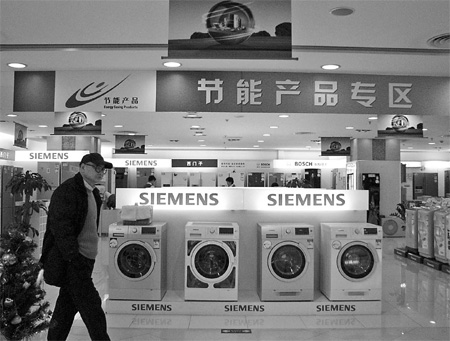Big opportunities seen in small cities
|
|
|
Washing machines on display at a Suning Appliance Co Ltd outlet in Beijing. Sales of home appliances in rural areas jumped 80 percent from a year ago to reach 10.49 million units in January, according to figures released by the Ministry of Commerce. [China Daily] |
China's home appliance market is expected to continue to outpace that of other countries in the coming years, but both domestic companies and multinationals have to venture into the country's smaller cities and rural areas to capitalize on the huge growth opportunity, said a senior industry analyst.
"The Chinese home appliance market is already enormous, but it still has high growth potential because of rising middle-class incomes, low penetration rates in small and rural cities and government subsidies," Waldemar Jap, Hong Kong-based partner and managing director of Boston Consulting Group (BCG), told China Daily.
In 2010, the home appliance industry achieved retail sales of 1.04 trillion yuan ($158.23 billion), up 18 percent from the previous year, marking the highest point in more than 10 years, according to the Beijing-based China Market Monitor Co, a leading consultancy in China's home appliance industry.
Among 15 consumer goods categories, home appliances emerged as the fifth most-likely category in which Chinese consumers intended to trade up, with 43 percent responding positively, according to Jap.
"The main catalyst of the market expansion will be the rapid income growth of Chinese consumers, particularly in small cities and rural areas," he said.
The number of China's middle-class and affluent consumers is projected to grow from 150 million to more than 400 million by 2020, and two-thirds of them, who are more likely to increase their spending and to trade up, will reside in small cities, according to BCG research.
"For home appliance companies, domestic and multinational, the next battlefield will be the country's smaller cities and rural areas," said Jap.
To take advantage of the opportunity, market players must understand the unique consumer behavior and the channel dynamics in small cities, recognizing regional differences and the existing competitors, Jap said.
He said that differences between consumers are noticeable when considering city tiers. Compared with consumers in large cities, those in small cities tend to care more about frequently used basic features and cost efficiency.
For example, consumers in first- and second-tier cities will consider whether a washing machine has advanced settings, such as control over water temperature or specific modes, while consumers in smaller cities and rural areas care primarily about overall effectiveness, electricity consumption and price.
According to Jap, another major driver of growth will be government subsidies, of which two are currently in effect - a rural discount, which provides a 13 percent subsidy for farmers who purchase certain appliances, and a "new-for-old" deal, which provides a 10 percent subsidy for consumers.
Sales of home appliances in rural areas jumped 80 percent from a year ago to reach 10.49 million units in January, with a total value of 25.36 billion yuan, according to figures released by the Ministry of Commerce.
However, the "new-for-old" subsidy will expire in December and the rural subsidy is scheduled to end in January 2013.
"As the subsidies near their end, we expect sales to peak, with an increasing number of consumers coming forward to take advantage, followed by a slowdown immediately after termination," Jap said.
 0
0 








Go to Forum >>0 Comments